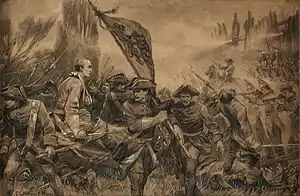Battle of Stresow
The successful Landing on Groß Stresow by Prussian, Danish and Saxon troops took place on 15 November 1715 on the island of Rügen, Germany during the Great Northern War. The landing was followed with cavalry assaults from the Swedish defences on the island, commanded by Charles XII king of Sweden who despite the huge numerical disadvantage of - one up against five - chose to attack the fortified camp. The Swedes managed to get past the "Cheval de frise" and break through, but were then rapidly repulsed and routed after taking heavy casualties.[2]
| Battle of Stresow | |||||||
|---|---|---|---|---|---|---|---|
| Part of the Great Northern War | |||||||
 Charles XII being carried away from the battle of Stresow after having suffered a bullet wound to his chest. | |||||||
| |||||||
| Belligerents | |||||||
|
|
| ||||||
| Commanders and leaders | |||||||
|
|
| ||||||
| Strength | |||||||
|
2,000 men 8 artillery pieces[1] |
11,500 men 26 artillery pieces[1] | ||||||
| Casualties and losses | |||||||
| 500 killed, wounded and captured[1] | 250 killed and wounded[1] | ||||||
The battle had lasted for almost an hour and Charles, who got his horse shot dead under him during the fight, later said: "Is there no god beside me?".[1] The attack was supposed to work like a needle-manoeuvre "concentrate the full attack at one point, break through and then destroy the defences from the inside" used by the Swedes fifteen years earlier in the battle of Narva, where they were greatly successful and victorious.[1]
About five hundred Swedes were either dead or wounded along with all their artillery captured.[3][1] The allied casualties were: 43 dead and 121 wounded Danes[4] 36 Saxons and 49 Prussians dead or wounded.[1] This was, however, probably the first notable Swedish field-battle defeat led directly by Charles XII.[lower-alpha 1] With the landing secured the alliance continued fighting off the last remaining Swedes on the island of Rügen and later joined up with the troops laying siege to Stralsund.[1]
See also
- Nils Krister von Baumgarten gave his horse to Charles XII who had suffered a bullet wound to his chest which allowed the Swedish king to get away after his previous horse got shot and killed. Baumgarten was later appointed Colonel of "Adelsfanan" by Charles.[5]
References
Footnotes
- Although Charles was present at the Battle of Poltava, a bullet wound he received to his foot before the battle prevented him from fully commanding his troops; so instead, overall command of the Swedish army was given to Carl Gustav Rehnskiöld.
Citations
- Curt Jany: Geschichte der Preußischen Armee - Vom 15. Jahrhundert bis 1914, Bd. 1, Biblio Verlag, P 640.
- http://freespace.virgin.net/adam.ceefer/stresow.html%5B%5D
- Larsson, Olle, ed. (2009). Stormaktens sista krig (in Swedish). Historiska Media. p. 270. ISBN 978-91-85873-59-3.
- Otto Vaupell, Den danske haers historie til nutiden og den norske haers historie indtil 1814. p. 519
- Nils Krister von Baumgarten